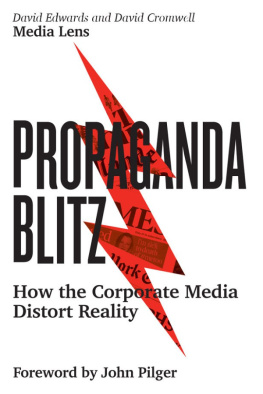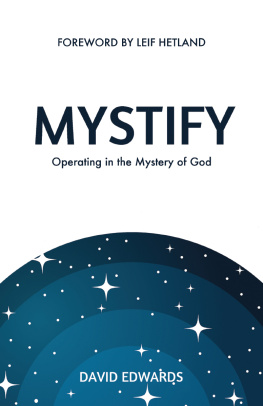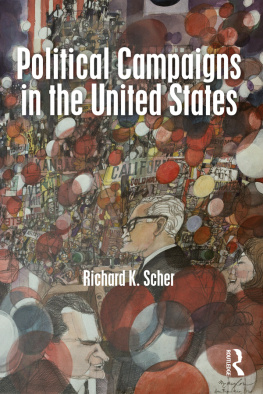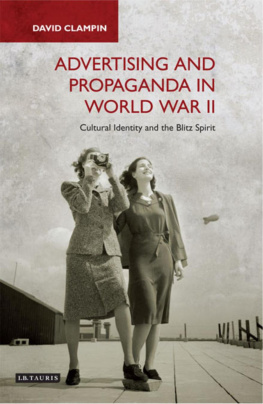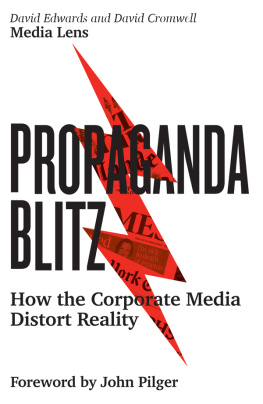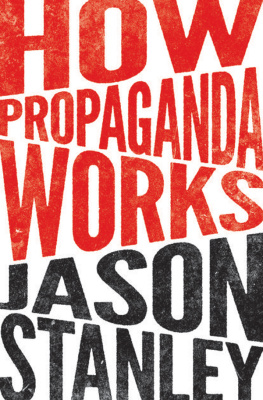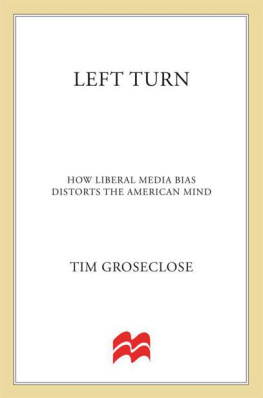Propaganda Blitz
Propaganda Blitz
How the Corporate Media
Distort Reality
David Edwards and David Cromwell
Foreword by John Pilger

First published 2018 by Pluto Press
345 Archway Road, London N6 5AA
www.plutobooks.com
Copyright David Edwards and David Cromwell 2018
The right of David Edwards and David Cromwell to be identified as the authors of this work has been asserted by them in accordance with the Copyright, Designs and Patents Act 1988.
British Library Cataloguing in Publication Data
A catalogue record for this book is available from the British Library
ISBN 978 0 7453 3812 5 Hardback
ISBN 978 0 7453 3811 8 Paperback
ISBN 978 1 7868 0330 6 PDF eBook
ISBN 978 1 7868 0332 0 Kindle eBook
ISBN 978 1 7868 0331 3 EPUB eBook
This book is printed on paper suitable for recycling and made from fully managed and sustained forest sources. Logging, pulping and manufacturing processes are expected to conform to the environmental standards of the country of origin.
Typeset by Stanford DTP Services, Northampton, England
Simultaneously printed in the United Kingdom and United States of America
Weve been slandered, libelled, trashed and traduced, ridiculed and reviled by much of mainstream journalism for two decades. And yet, simultaneously, surreally, we have received the unfailing support of someone whose opinion matters more to us than all the rest of them combined. Knowing that the finest political journalist of our time believes in what were doing has made a huge difference to us. We dedicate this book to John Pilger. Onwards!
Contents
Foreword
John Pilger
When I sat down to write this, Robert Parry had just died. One of Americas finest reporters, Parry was, wrote Seymour Hersh, a trailblazer for independent journalism. Hersh and Parry had much in common; Hersh revealed the My Lai massacre in Vietnam and the secret bombing of Cambodia, Parry exposed Iran-Contra, a drugs and gun-running conspiracy that led to the White House. In 2016, they each produced evidence that disputed the claim that the Assad government in Syria had used chemical weapons. They were not forgiven.
Driven from the mainstream, Hersh must publish his work outside the United States. Parry set up his own independent news website where, in a final piece following a stroke in December 2017, he wrote, Whether they would admit it or not, [Western journalists] believe in a guided democracy in which approved opinions are elevated regardless of their absence of factual basis and unapproved evidence is brushed aside or disparaged regardless of its quality.
This is not how many journalists see themselves. They imagine they set the public record straight and check the excesses of power, which Edmund Burke called a fourth estate. The BBC goes further and ordains itself a divinity on earth, speaking truth to power: an exquisite nonsense that has endured since its founder secretly wrote propaganda for a Tory prime minister during Britains General Strike.
Although journalism the media was always a loose extension of establishment power, something has changed in recent years. Dissent tolerated when I joined a national newspaper in Britain in the 1960s has regressed to a metaphoric underground as liberal capitalism moves towards a form of corporate dictatorship. This is a historic shift, with journalists themselves policing the new groupthink, as Parry wrote, dispensing its myths and distractions, pursuing its enemies.
Witness the witch-hunts, the campaigns against refugees and immigrants, the anti-Russia and Brexit hysteria, a growing anti-China campaign and the suppression of public discussion of a beckoning world war.
With many independent journalists ejected from the mainstream, a corner of the Internet has become a vital source of disclosure and evidence-based analysis: what some would call true journalism. Sites such as wikileaks.org, consortiumnews.com, wsws.org, truthdig.com, globalresearch.org, counterpunch.org, informationclearinghouse.com and zcomm.org are required reading for those trying to make sense of a world in which science and technology advance wondrously while political and economic life regress behind a media facade of spectacle and propaganda.
In Britain, just one website offers consistently independent media criticism. This is the remarkable Media Lens remarkable because its founders and editors as well as its only writers, David Edwards and David Cromwell, since 2001 have concentrated their gaze not on the usual suspects, the Tory press, but the paragons of reputable liberal journalism the BBC, the Guardian, Channel 4 News.
Their method is simple. Meticulous in their research, they are respectful and polite when they email a journalist to ask why he or she produced such a one-sided report, or failed to disclose essential facts or promoted discredited myths. The replies they receive are often defensive, at times abusive; some are hysterical, as if they have pushed back a screen on a protected species.
My impression is that they have shattered a silence about corporate journalism. Like Edward Herman and Noam Chomsky in Manufacturing Consent, they represent a Fifth Estate, questioning, deconstructing and ultimately demystifying the medias monopoly.
What is especially interesting about them is that neither is a journalist. David Edwards was a teacher, David Cromwell is a former scientist. Yet, their understanding of the morality of real journalism a term rarely used; lets call it true objectivity is a bracing quality of their online Media Lens dispatches.
In 2007, they were awarded the Gandhi Foundation International Peace Award. I was asked to contribute to the citation. Without Media Lens during the attack on and occupation of Iraq, I wrote, the full gravity of that debacle might have been consigned to oblivion, and to bad history.
Such is the importance of their work, which I think is heroic. I would place a copy of this book in every journalism school that services the corporate system, as they all do.
How does the system work? , Dismantling the National Health Service, describes the critical part played by journalists in the crisis facing Britains pioneering health service.
The NHS crisis is the product of a political and media construct known as austerity, with its weasel language of efficiency savings (the BBC term for the slashing of public expenditure) and hard choices (meaning the wilful destruction of many of the premises of civilised life in Britain).
Austerity is a political and media construct, an invention. Britain is a rich country with a debt owed not by its people but by crooked banks. The resources that would comfortably fund the National Health Service are stolen in broad daylight by the few allowed to avoid and evade billions in taxes.
The publicly-funded health service is being deliberately run down by free-market zealots, to justify its selling-off. The Conservative Secretary of State for Health, Jeremy Hunt, is one such zealot.
This is sometimes alluded to in the media, but rarely explained.
Edwards and Cromwell do what journalists should have done: they dissect the 2012 Health and Social Care Act, whose innocuous title belies its dire consequences. Unknown to most of the population, the Act ends the legal obligation of British governments to provide universal free healthcare: the bedrock on which the NHS was set up following the Second World War. Private companies can now take over NHS infrastructure, insinuating their piracy, piece by piece.
Where, ask Edwards and Cromwell, was the BBC while the bill was making its way through Parliament? With a statutory commitment to providing a breadth of view and properly to inform the public of matters of public policy, the BBC never spelt out the threat posed to one of the nations most cherished institutions. BBC News reported, Bill which gives power to GPs passes. This was pure state propaganda.
Next page
